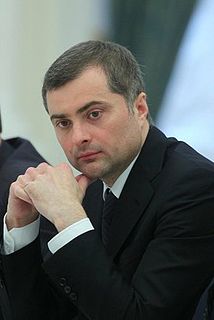A Quote by Vladislav Surkov
When the Soviet Union was dissolved, most of us didn't even have the feeling that the country was falling apart. We thought we would continue with our lives as in the past, but as good neighbors.
Related Quotes
This much I would say: Socialism has failed all over the world. In the eighties, I would hear every day that there is no inflation in the Soviet Union, there is no poverty in the Soviet Union, there is no unemployment in the Soviet Union. And now we find that, due to Socialism, there is no Soviet Union!
Why were the Europeans bothered about the Soviet Union at all? It was nothing to do with us. China had nothing to do with us. Why were we not building, without reference to the Soviet Union, a good society in our own countries? But no, we were all - in one way or another - obsessed with the bloody Soviet Union, which was a disaster. What people were supporting was failure. And continually justifying it.
Women are the most denigrated social group in the Soviet Union. The idea of women's emancipation is only a slogan in - but also, I should say, in many places outside - the Soviet Union. But especially in the militaristic Soviet society, people only thought of life in terms of struggle and the workers' toil.
25 million of Russian people suddenly turned out to be outside the borders of the Russian Federation. They used to live in one state; the Soviet Union has traditionally been called Russia, the Soviet Russia, and it was the great Russia. Then the Soviet Union suddenly fell apart, in fact, overnight, and it turned out that in the former Soviet Union republics there were 25 million Russians. They used to live in one country and suddenly found themselves abroad. Can you imagine how many problems came out?
We cannot expect to be in control of the circumstances in our lives when we cannot control our minds for five minutes. Meditation is the daily minimum requirement that will prevent us from breaking down and falling apart at the most inopportune moments. It is the art of listening. It is a practice which enables us to tune in and fine-tune the key areas of our lives: the mind and the spirit.
so, the whole idea, you see, is that everything's falling apart, so don't try and stop it. when you're falling off a precipice, it doesn't do you any good to hang onto a rock that's falling with you. see? but everything is doing that. and so, again, this is another case of our completely wasting our energy in trying to prevent the world from falling apart. don't do it. and then you'll be able to do something interesting with the free energy.
The first year I was in office, only about 800 people came out of the Soviet Union, Jews. By the third year I was in office... second year, 1979, 51,000 came out of the Soviet Union. And every one of the human rights heroes - I'll use the word - who have come out of the Soviet Union, have said it was a turning point in their lives, and not only in the Soviet Union but also in places like Czechoslovakia and Hungary and Poland [they] saw this human rights policy of mine as being a great boost to the present democracy and freedom that they enjoy.
Why is one a slave to thought ? Why has thought become so important in all our lives -thought being ideas, being the response to the accumulated memories in the brain cells? Perhaps many of you have not even asked such a question before, or if you have you may have said, "it's of very little importance- what is important is emotion." But I don't see how you can separate the two. If thought does not give continuity to feeling, feeling dies very quickly. So why in our daily lives, in our grinding, boring, frightened lives, has thought taken on such inordinate importance?
The Soviet Union came apart along ethnic lines. The most important factor in this breakup was the disinclination of Slavic Ukraine to continue under a regime dominated by Slavic Russia. Yugoslavia came apart also, beginning with a brutal clash between Serbia and Croatia, here again 'nations' with only the smallest differences in genealogy; with, indeed, practically a common language. Ethnic conflict does not require great differences; small will do.
Strong countries and strong presidents talk to their adversaries. That's what Kennedy did with Khrushchev. That's what Reagan did with Gorbachev. That's what Nixon did with Mao. I mean think about it. Iran, Cuba, Venezuela - these countries are tiny compared to the Soviet Union. They don't pose a serious threat to us the way the Soviet Union posed a threat to us. And yet we were willing to talk to the Soviet Union at the time when they were saying we're going to wipe you off the planet.

































